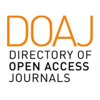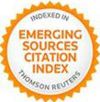Abstract
The Taranto basin, a complex marine ecosystem with typical lagoon features, has been declared Site of National Interest (SIN) because of serious contamination of marine sediment. Since February 2014, The Coastal Engineering Laboratory (LIC) of DICATECh of the Polytechnic University of Bari (Italy) maintains a place-based research programme in the Mar Grande and Mar Piccolo of Taranto, providing records of hydrodynamic and water-quality measurements.
Taranto, like the rest of Italy, had a lockdown since March 2020 which has reduced the industrial activity which is the main source of human stress on the ecosystem of the Mar Piccolo and Mar Grande. Here, the impact of COVID-19 lockdown on sea surface temperature SST is investigated using the satellite and in situ measurements. Rising sea surface temperatures related to global warming are increasingly affecting marine habitats and people who depend on them.Keywords
Full Text:
PDFDOI: http://dx.doi.org/10.2423/i22394303v13n2p17
References
Alabiso, G., Cannalire, M., Ghionda, D., Milillo, M., Leone, G., & Caciorgna, O. (1997). Particulate matter and chemical-physical 18 conditions of an inner sea: The Mar Piccolo in Taranto. A new statistical approach. Marine Chemistry, 58 (3), 373-388.
Alabiso, G., Giacomini, M., Milillo, M., & Ricci, P. (2005). The Taranto sea system: 8 years of chemical–physical 20 measurements. Biol Mar Mediterr., 12 (1), 369-373.
Armenio, E., Ben Meftah, M., Bruno, M. F., De Padova, D., De Pascalis, F., De Serio, F., Di Bernardino, A., Mossa, M., Leuzzi, G., & Monti, P. (2016). Semi enclosed basin monitoring and analysis of meteo, wave, tide and current data: Sea monitoring. In Proceedings of Environmental, Energy, and Structural Monitoring Systems (EESMS), IEEE Workshop (pp. 1-6). Bari, Italy.
Armenio, E., De Padova, D., De Serio, F., & Mossa, M. (2017). Monitoring system for the sea: Analysis of meteo, wave and current data. In Proceedings of IMEKO TC19 Workshop on Metrology for the Sea, MetroSea (pp. 143-148). Naples, Italy.
Armenio, E., De Padova, D., De Serio, F., & Mossa, M. (2018a). Monitoring system in mar Grande basin (Ionian Sea). (2018). IEEE International Workshop on Metrology for the Sea; Learning to Measure Sea Health Parameters, MetroSea (pp. 104–109).
Armenio, E., De Padova, D., De Serio, F., & Mossa, M. (2018b). Environmental technologies to safeguard coastal heritage. SCIRES‐IT ‐ SCIentific RESearch and Information Technology, 8(1), 61-78. http://dx.doi.org/10.2423/i22394303v8n1p61
Armenio, E., Ben Meftah, M., De Padova, D., De Serio, F., & Mossa, M. (2019). Monitoring Systems and Numerical Models to Study Coastal Sites. Sensors, 19, 1552.
Boero, F., Foglini, F., Fraschetti, S., Goriup, P., Macpherson, E., Planes, S., Soukissian, T., & The CoCoNet Consortium (2016). CoCoNet: towards coast to coast networks of marine protected areas (from the shore to the high and deep sea), coupled with sea-based wind energy potential. SCIRES-IT - SCIentific RESearch and Information Technology, 6 (Suppl.), 1-95. http://www.sciresit.it/article/download/12592/11435.
Braga, F., Scarpa, G.M., Brando, V.E., Manfè, G., & Zaggia, L. (2020). COVID-19 lockdown measures reveal human impact on water transparency in the Venice Lagoon. Science of The Total Environment, 76, 139612.
Braga, F., Ciani, D., Colella, S., Organelli, E. Pitarch, J., Brando, V.E., Bresciani, M. Concha, J.A., Giardino, C., Scarpa, G. M., Volpe, G., Rio, M.H., & Falcini, F. (2022). COVID-19 lockdown effects on a coastal marine environment: Disentangling perception versus reality. Science of The Total Environment, 817,153002.
Carlucci, R., Cipriano, G., Cornelia F., Ricci, P., Maglietta, R., Mazzariol, S., De Padova, D., Mossa, M., Bellomo, S., & Fanizza, C. (2020). Exploring data from an individual stranding of a Cuvier's beaked whale in the Gulf of Taranto (Northern Ionian Sea, Central-eastern Mediterranean Sea). Journal of Experimental Marine Biology and Ecology, 533, 151473.
Cardellicchio, N., Annicchiarico, C., Di Leo, A., Giandomenico, S., & Spada, L. (2016). The Mar Piccolo of Taranto: An interesting marine ecosystem for the environmental problems studies. Environmental Science and Pollution Research, 23, 12495–12501.
Caroppo, C., & Cardellicchio, N. (1995). Preliminary study on phytoplankton communities of Mar Piccolo in Taranto (Jonian 37 Sea). Oebalia XXI (pp. 61-76).
Chimienti, G., De Padova, D., Mossa, M., & Mastrototaro, F. (2020). A mesophotic black coral forest in the Adriatic Sea. Scientific Reports, 10(1), 8504.
Chimienti, G., De Padova, D., Adamo, M., Mossa, M., Bottalico, A., Lisco, A., Ungaro, N., & Mastrototaro, F. (2021). Effects of global warming on Mediterranean coral forests. Scientific Reports, 11(1), 20703.
Cook, M., Schott, J. R., Mandel, J., & Raqueno, N. (2014). Development of an operational calibration methodology for the Landsat thermal data archive and initial testing of the atmospheric compensation component of a Land Surface Temperature Product from the archive. Remote Sensing, 6(11), 11244-11266.
De Padova, D., De Serio, F., Mossa, M., & Armenio, E. (2017). Investigation of the current circulation offshore Taranto by using field measurements and numerical model. In Proceedings of the 2017 IEEE International Instrumentation and Measurement Technology Conference. Torino, Italy.
De Padova, D., Ben Meftah, M., De Serio, F., & Mossa, M. (2020). Management of Dredging Activities in a Highly Vulnerable Site: Simulation Modelling and Monitoring Activity. J. Mar. Sci. Eng., 8, 1020.
De Padova, D., & Mossa, M. (2021). Multi-phase simulation of infected respiratory cloud transmission in air. AIP Adv., 11, 035035.
De Padova, D., Di Leo, A., & Mossa, M. (2023). COVID-19 Lockdown Effects on a Highly Contaminated Coastal Site: The Mar Piccolo Basin of Taranto. Water, 15, 1220.
De Pascalis, F., Petrizzo, A., Ghezzo, M., Lorenzetti, G., Manfè, G., Alabiso, G., & Zaggia, L. (2015), Estuarine circulation in the Taranto Seas, Environmental Science and Pollution Research, 23(13), 12515-34.
De Serio, F & Mossa, M. (2016). Environmental monitoring in the Mar Grande basin (Ionian Sea, Southern Italy) Environmental Science and Pollution Research. 23, 12662–1267.
De Serio, F., Armenio, E., Ben Meftah, M., Capasso, G., Corbelli, V., De Padova, D., De Pascalis, F., Di Bernardino, A., Leuzzi, G., Monti, P., Pini, A., Velardo, R., & Mossa, M. (2020). Detecting sensitive areas in confined shallow basins. Environmental Modelling and Software, 126, 104659.
Depellegrin, D. Bastianini, M., Fadini, A., & Menegon, S. (2020). The effects of COVID-19 induced lockdown measures on maritime settings of a coastal region. Science of The Total Environment, 740, 140123.
Di Leo, A., Annicchiarico, C., Cardellicchio, N., Giandomenico, S., & Spada, L. (2013). Trace metal distributions in Posidonia oceanica and sediments from Taranto Gulf (Ionian Sea, Southern Italy). Mediterr Mar Sci 14(1), 204–213.
Elsaid, K., Olabi, V., Sayed, E.T., Wilberforce, T., & Abdelkareem, M.A. (2021). Effects of COVID-19 on the environment: An overview on air, water, wastewater, and solid waste. J Environ Manage. 15(292), 112694.
Heron, S. F., Maynard, J. A., van Hooidonk, R., & Eakin, C. M. (2016). Warming trends and bleaching stress of the World’s coral reefs 1985–2012. Scientific Report. 6, 38402.
Liu, F., Wang, M., & Zheng, M. (2021). Effects of COVID-19 lockdown on global air quality and health. Sci. Total Environ, 755(Pt.1), 142533.
Manoiu, V., Katarzyna K.W., Craciun A.I.., Akman. C., & Akman E. (2022). Water Quality and Water Pollution in Time of COVID-19: Positive and Negative Repercussions. Water, 14(7), 1124.
Mossa, M., Armenio, E., Ben Meftah, M., Bruno, M.F., De Padova, D., & De Serio, F. (2021). Meteorological and hydrodynamic data in the Mar Grande and Mar Piccolo, Italy, of the Coastal Engineering Laboratory (LIC) Survey, winter and summer 2015. Earth System Science Data, 13 (2), 599-607.
Patel, P.P., Mondal, S., & Ghosh, K.G. (2020). Some respite for India's dirtiest river? Examining the Yamuna's water quality at Delhi during the COVID-19 lockdown period. Sci. Total Environ. 2020(744), 140851.
Selvam, S., Jesuraja, K., Venkatramanan, S., Chung, S.Y., Roy, P.D., Muthukumar, P., & Kumar, M. (2020). Imprints of pandemic lockdown on subsurface water quality in the coastal industrial city of Tuticorin, South India: a revival perspective. Sci. Total Environ. 2020(738),139848.
Umgiesser, G., Scroccaro, I., & Alabiso, G. (2007). Mass exchange mechanisms in the Taranto Sea. Transitional Waters Bulletin I(2), 59–71.
Vijay, P., K., Vimala, G., Preethi Latha, T., Jayaram, C., Nagamani, P.V., & Laxmi, C.N. (2021). Assessment of water quality along the southeast coast of India during COVID-19 lockdown. Frontiers in Marine Science, 8, 338.
Wang, J., Shen, J., Ye, D., Yan, X., Zhang, Y., Yang, W., Li, X., Wang, J., Zhang, L., & Pan, L. (2020). Disinfection technology of hospital wastes and wastewater: Suggestions for disinfection strategy during coronavirus Disease 2019 (COVID-19) pandemic in China. Environmental Science and Pollution Research, 262, 114665.
Yunus, A.P., Masago, Y., & Hijioka, Y. (2020). COVID-19 and surface water quality: improved lake water quality during the lockdown. Sci. Total Environ. 2020(731), 139012.
Yusoff, F.M., Abdullah, A.F., Aris, A.Z., & Umi, W.A.D. (2021). Impacts of COVID-19 on the Aquatic Environment and Implications on Aquatic Food Production. Sustainability, 13(20), 11281.
Article Metrics
Metrics powered by PLOS ALM
Refbacks
- There are currently no refbacks.
Copyright (c) 2023 Diana De Padova, Simona Amodio, Michele Mossa, Maria Adamo

This work is licensed under a Creative Commons Attribution-NonCommercial-NoDerivatives 4.0 International License.
SCIRES-IT, e-ISSN 2239-4303
Journal founded by Virginia Valzano






